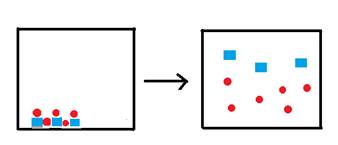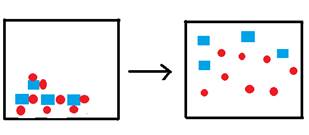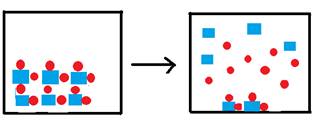
PRINCIPLES+REACTIONS
8th Edition
ISBN: 9781337759632
Author: Masterton
Publisher: CENGAGE L
expand_more
expand_more
format_list_bulleted
Concept explainers
Textbook Question
Chapter 15, Problem 66QAP
The box below represents one liter of a saturated solution of the species  , where squares represent the cation and circles represent the anion. Water molecules, though present, are not shown.
, where squares represent the cation and circles represent the anion. Water molecules, though present, are not shown.

Complete the next three figures below by filling one-liter boxes to the right of the arrow, showing the state of the ions after water is added to form saturated solutions. The species represented to the left of the arrow is the solid form of the ions represented above. Do not show the water molecules.

Expert Solution & Answer
Want to see the full answer?
Check out a sample textbook solution
Students have asked these similar questions
Some chemical compounds are listed in the first column of the table below. Each compound is soluble in water.
Imagine that a few tenths of a mole of each compound is dissolved in a liter of water. The important chemical species that would be present in this solution are
written in the second column of the table. Use the checkboxes to classify each compound.
type of compound (check all that apply)
important species present
when dissolved in water
compound
ionic molecular strong weak strong weak
base
acid
acid
base
KCIO 4
K, C1o,, H,0
NaOH
Na', он , н,о
C,H,NH,
C,H,NH OH ,C,H,NH,, H,0
H C1O4
H,0", Cio, H,0
Check
Explanation
O 2021 McGraw-Hill Education. All Rights Reserved. Terms of Use I Privacy | Accessibi
W
APR
O00 O
O00
Some chemical compounds are listed in the first column of the table below. Each compound is soluble in water.
Imagine that a few tenths of a mole of each compound is dissolved in a liter of water. The important chemical species that would be pres
written in the second column of the table. Use the checkboxes to classify each compound.
type of compound (check all that apply)
important species present
when dissolved in water
compound
ionic molecular strong weak strong weak
base
acid
acid
base
HNO,
H,0", NO,, H,0
HC,H,0,
H,0", C,H,0,, HC,H,0,, H,0
к', он, н,о
КОн
NaNO,
Na", NO,, H,0
Check
Explanation
O2021 McGraw-Hill Education. All Rights Res
APR
Recognizing common acids and bases
Some soluble compounds are listed in the table below.
Complete the table by filling in the name or chemical formula of each compound, whichever is missing. (If there is more than one way to name the compound,
choose the name used when the compound is dissolved in water.) Also classify the compound using the checkboxes.
compound
0
KOH
0
name
acetic acid
ammonia
0
sodium perchlorate
type of compound (check all that apply)
strong weak strong weak
acid acid
base base
ionic molecular
000
O
On
Chapter 15 Solutions
PRINCIPLES+REACTIONS
Ch. 15 - Write a net ionic equation for the reaction...Ch. 15 - Write a net ionic equation for the reaction...Ch. 15 - Write a balanced net ionic equation for the...Ch. 15 - Write a balanced net ionic equation for the...Ch. 15 - Calculate K for the reactions in Question 1.Ch. 15 - Calculate K for the reactions in Question 2.Ch. 15 - Calculate K for the reactions in Question 3.Ch. 15 - Calculate K for the reactions in Question 4.Ch. 15 - Calculate [H+] and pH in a solution in which...Ch. 15 - Calculate [OH-] and pH in a solution in which the...
Ch. 15 - A buffer is prepared by dissolving 0.0250 mol of...Ch. 15 - Prob. 12QAPCh. 15 - A buffer solution is prepared by adding 15.00 g of...Ch. 15 - A buffer solution is prepared by adding 5.50 g of...Ch. 15 - A solution with a pH of 9.22 is prepared by adding...Ch. 15 - An aqueous solution of 0.057 M weak acid, HX, has...Ch. 15 - Which of the following would form a buffer if...Ch. 15 - Which of the following would form a buffer if...Ch. 15 - Calculate the solubility (in grams per liter) of...Ch. 15 - Calculate the solubility (in grams per liter) of...Ch. 15 - Copper(l) chloride, CuCl, is the starting material...Ch. 15 - Prob. 22QAPCh. 15 - Prob. 23QAPCh. 15 - Ksp for CaSO4 at 100C is estimated to be1.6105. At...Ch. 15 - Prob. 25QAPCh. 15 - At 25C, 10.24 mg of Cr(OH)2 are dissolved in...Ch. 15 - Calcium nitrate is added to a sodium sulfate...Ch. 15 - Cadmium(ll) chloride is added to a solution of...Ch. 15 - Water from a well is found to contain 3.0 mg of...Ch. 15 - Silver(I) sulfate (Ksp=1.2105) is used in the...Ch. 15 - A solution is prepared by mixing 13.00 mL of...Ch. 15 - A solution is prepared by mixing 45.00 mL of 0.022...Ch. 15 - A solution is 0.047 M in both NaF and Na2CO3....Ch. 15 - Solid lead nitrate is added to a solution that is...Ch. 15 - A solution is made up by adding 0.632 g of barium...Ch. 15 - A solution is made up by adding 0.839 g of...Ch. 15 - Prob. 37QAPCh. 15 - To a beaker with 500 mL of water are added 95 mg...Ch. 15 - Write net ionic equations for the reaction of H+...Ch. 15 - Prob. 40QAPCh. 15 - Prob. 41QAPCh. 15 - Write a net ionic equation for the reaction with...Ch. 15 - Prob. 43QAPCh. 15 - Write a net ionic equation for the reaction with...Ch. 15 - Prob. 45QAPCh. 15 - Write an overall net ionic equation and calculate...Ch. 15 - Consider the reaction...Ch. 15 - Consider the reaction BaF2(s)+SO42(aq)BaSO4(s)+2...Ch. 15 - Aluminum hydroxide reacts with an excess of...Ch. 15 - Prob. 50QAPCh. 15 - Calculate the molar solubility of gold(I) chloride...Ch. 15 - Calculate the molar solubility of PbCl2 in 0.2 M...Ch. 15 - For the reaction...Ch. 15 - For the reaction Zn(OH)2(s)+2OH(aq)Zn(OH)42(aq)...Ch. 15 - What are the concentrations of Cu2+, NH3, and...Ch. 15 - Prob. 56QAPCh. 15 - Calcium ions in blood trigger clotting. To prevent...Ch. 15 - Prob. 58QAPCh. 15 - A town adds 2.0 ppm of F- ion to fluoridate its...Ch. 15 - Consider the following hypothetical dissociation:...Ch. 15 - Prob. 61QAPCh. 15 - Consider a 2.0-L aqueous solution of 4.17 M NH3,...Ch. 15 - Marble is almost pure CaCO3. Acid rain has a...Ch. 15 - Prob. 64QAPCh. 15 - Prob. 65QAPCh. 15 - The box below represents one liter of a saturated...Ch. 15 - Consider a saturated solution of BaCO3 at 7.5C....Ch. 15 - Prob. 68QAPCh. 15 - Consider the insoluble salts JQ, K2R, L2S3, MT2,...Ch. 15 - Prob. 70QAPCh. 15 - Consider the equilibrium curve for AgCl shown...Ch. 15 - Dissolving CaCO3 is an endothermic reaction. The...Ch. 15 - Challenge Problems Insoluble hydroxides such as...Ch. 15 - What is the solubility of CaF2 in a buffer...Ch. 15 - What is [Br-] just as AgCl begins to precipitate...Ch. 15 - Prob. 76QAPCh. 15 - Prob. 77QAPCh. 15 - Prob. 78QAP
Knowledge Booster
Learn more about
Need a deep-dive on the concept behind this application? Look no further. Learn more about this topic, chemistry and related others by exploring similar questions and additional content below.Similar questions
- . Which of the following will affect the total amount of solute that can dissolve in a given amount of solvent? a. The solution is stirred. b. The solute is ground to line particles before dissolving. c. The temperature changes.arrow_forwardHow many ions, per formula unit, are produced when each of the following soluble salts (strong electrolytes) dissolves in water? a. NaCl b. Mg(NO3)2 c. K2S d. NH4CNarrow_forwardSome chemical compounds are listed in the first column of the table below. Each compound is soluble in water. Imagine that a few tenths of a mole of each compound is dissolved in a liter of water. The important chemical species that would be present in this solution are written in the second column of the table. Use the checkboxes to classify each compound. type of compound (check all that apply) compound important species present when dissolved in water ionic molecular strong weak strong weak acid acid base base NaClO4 Na, CIO, H₂O 0 0 0 ΗΝΟ, H₂O, NO₂, HNO₂, H₂O 0 0 0 0 0 NaOH Na, OH, H₂O 0 0 0 0 0 NH₁₂ NH, OH, NH3, H₂O 0 Give detailed Solution with explanation needed of each..don't give Handwritten answerarrow_forward
- Some chemical compounds are listed in the first column of the table below. Each compound is soluble in water. Imagine that a few tenths of a mole of each compound is dissolved in a liter of water. The important chemical species that would be present in this solution are written in the second column of the table. Use the checkboxes to classify each compound. type of compound (check all that apply) compound Important species present when dissolved in water ionic molecular strong weak strong weak acid acid base base 2+ Ba(OH)₂ Ba, OH, H₂O 0 0 CHẠNH, C₂H₂NH₂, OH, C₂H₂NH₂, H₂O но 0 0 0 0 + ΚΙ K, I, H₂O NaOH Na, OH, H₂O 0 0 X □ 3 ?arrow_forwardSome soluble compounds are listed in the table below. Complete the table by filling in the name or chemical formula of each compound, whichever is missing. (If there is more than one way to name the compound, choose the name used when the compound is dissolved in water.) Also classify the compound using the checkboxes. compound 0 HCH₂ CO₂ NH3 HCIO4 name barium hydroxide 0 0 type of compound (check all that apply) strong weak strong weak acid base base acid ionic molecular 0 0 0 0 X Sarrow_forwardA student wants to determine the unknown concentration of a sample of sulfuric acid. She performs a titration between her sample of sulfuric acid and potassium hydroxide and collects the data below. Determine the unknown concentration of sulfuric acid.arrow_forward
- bl Some chemical compounds are listed in the first column of the table below. Each compound is soluble in water. Imagine that a few tenths of a mole of each compound is dissolved in a liter of water. The important chemical species that would be present in this solution are written in the second column of the table. Use the checkboxes to classify each compound. type of compound (check all that apply) important species present when dissolved in water compound ionic molecular strong weak strong weak acid acid base base Ba (он), Ba, OH , H,0 2+ Ва он ,н,о KI K*,1,H,0 NH3 NH, OH, NH,, H,0 H,0°,1,H,0 HI Check planation O 2021 McGraw Hill Education. All Rights Reserved Tems of Use Pvacy Accessibility 會 APR MacBook Air F10 19 F6 吕口 F3 F4 F2 esc F1 * & % 5 # $ 8 9 6arrow_forwardRecognizing common acids and bases Some soluble compounds are listed in the table below. Complete the table by filling in the name or chemical formula of each compound, whichever is missing. (If there is more than one way to name the compound, choose the name used when the compound is dissolved in water.) Also classify the compound using the checkboxes. compound 0 NH₂ NaOH name nitric acid sodium perchlorate □ 0 type of compound (check all that apply) strong weak strong weak acid acid base base ionic molecular O O O O O O O O X Ś olo 18 Ararrow_forwardA student performs a titration in order to determine the concentration of a hydrochloric acid solution. Early in the procedure, the flask is not placed directly under the buret and a small amount of the titrant, KOH, drains down the outside of the flask. How will this error affect the calculated value of the HCI concentration? O more information is necessary O calculated value = actual value O calculated value > actual value O calculated value < actual valuearrow_forward
- Some chemical compounds are listed in the first column of the table below. Each compound is soluble in water. Imagine that a few tenths of a mole of each compound is dissolved in a liter of water. The important chemical species that would be present in this solution are written in the second column of the table. Use the checkboxes to classify each compound. type of compound (check all that apply) important species present when dissolved in water compound strong weak strong weak base ionic molecular acid acid base HNO, H,0", NO,, HNO,, H,0 HNO, H,0", NO,, H,0 NH, NH, OH , NH,, H,0 2+ Ba (ОН), Ba , он ,н,о Explanation Check © 2022 McGraw Hill LLC. All Rights Reserved. Terms of Use I Privacy Center | Acces tv 22 MacBook Proarrow_forwardA CHM 122 student considers an ionic compound M,X, that contains the metal cation M2 and the anion X. 7. The student determines that the molar solubility of M,X, is 2.7 x 10mol/L. What is the Kan value for this compound? Type your answer in the space below using scientific notation. (example: 0.012 = 1.2*10^-2)arrow_forwardConstants | Periodic Table These questions refer to determing unknown concentrations of acids and/or bases. Part A In a titration experiment, a solution of rubidium hydroxide (RBOH) of unknown concentration was titrated with a solution of nitric acid (HNO3) of known concentration. 15.00 mL of the unknown rubidium hydroxide (RbOH) solution required 23.21 mL of 0.1429 mol L-1 nitric acid (HNO3) solution. What is the concentration of the rubidium hydroxide (RbOH) solution? OH 9.235x10-2 mol L-1 0.2211 mol L-1 0.2322 mol L- 0.1429 mol L-1 0.2587 mol L |-1arrow_forward
arrow_back_ios
SEE MORE QUESTIONS
arrow_forward_ios
Recommended textbooks for you
 Chemistry: Principles and ReactionsChemistryISBN:9781305079373Author:William L. Masterton, Cecile N. HurleyPublisher:Cengage Learning
Chemistry: Principles and ReactionsChemistryISBN:9781305079373Author:William L. Masterton, Cecile N. HurleyPublisher:Cengage Learning Chemistry for Today: General, Organic, and Bioche...ChemistryISBN:9781305960060Author:Spencer L. Seager, Michael R. Slabaugh, Maren S. HansenPublisher:Cengage Learning
Chemistry for Today: General, Organic, and Bioche...ChemistryISBN:9781305960060Author:Spencer L. Seager, Michael R. Slabaugh, Maren S. HansenPublisher:Cengage Learning- Chemistry: Matter and ChangeChemistryISBN:9780078746376Author:Dinah Zike, Laurel Dingrando, Nicholas Hainen, Cheryl WistromPublisher:Glencoe/McGraw-Hill School Pub Co
 Introductory Chemistry: A FoundationChemistryISBN:9781337399425Author:Steven S. Zumdahl, Donald J. DeCostePublisher:Cengage Learning
Introductory Chemistry: A FoundationChemistryISBN:9781337399425Author:Steven S. Zumdahl, Donald J. DeCostePublisher:Cengage Learning World of Chemistry, 3rd editionChemistryISBN:9781133109655Author:Steven S. Zumdahl, Susan L. Zumdahl, Donald J. DeCostePublisher:Brooks / Cole / Cengage Learning
World of Chemistry, 3rd editionChemistryISBN:9781133109655Author:Steven S. Zumdahl, Susan L. Zumdahl, Donald J. DeCostePublisher:Brooks / Cole / Cengage Learning

Chemistry: Principles and Reactions
Chemistry
ISBN:9781305079373
Author:William L. Masterton, Cecile N. Hurley
Publisher:Cengage Learning

Chemistry for Today: General, Organic, and Bioche...
Chemistry
ISBN:9781305960060
Author:Spencer L. Seager, Michael R. Slabaugh, Maren S. Hansen
Publisher:Cengage Learning


Chemistry: Matter and Change
Chemistry
ISBN:9780078746376
Author:Dinah Zike, Laurel Dingrando, Nicholas Hainen, Cheryl Wistrom
Publisher:Glencoe/McGraw-Hill School Pub Co

Introductory Chemistry: A Foundation
Chemistry
ISBN:9781337399425
Author:Steven S. Zumdahl, Donald J. DeCoste
Publisher:Cengage Learning

World of Chemistry, 3rd edition
Chemistry
ISBN:9781133109655
Author:Steven S. Zumdahl, Susan L. Zumdahl, Donald J. DeCoste
Publisher:Brooks / Cole / Cengage Learning
Solutions: Crash Course Chemistry #27; Author: Crash Course;https://www.youtube.com/watch?v=9h2f1Bjr0p4;License: Standard YouTube License, CC-BY